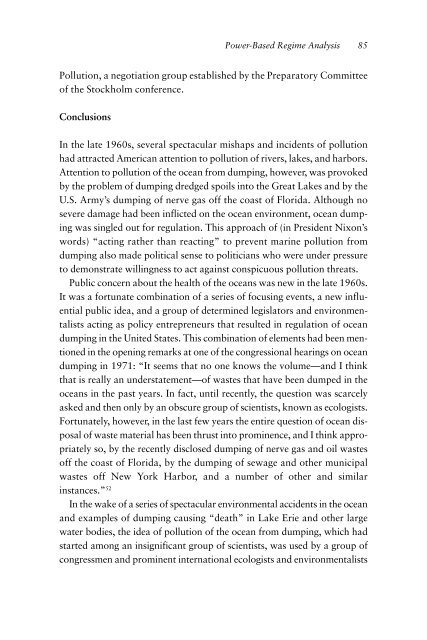Radioactive Waste Disposal at Sea: Public Ideas ... - IMO
Radioactive Waste Disposal at Sea: Public Ideas ... - IMO
Radioactive Waste Disposal at Sea: Public Ideas ... - IMO
Create successful ePaper yourself
Turn your PDF publications into a flip-book with our unique Google optimized e-Paper software.
Power-Based Regime Analysis 85<br />
Pollution, a negoti<strong>at</strong>ion group established by the Prepar<strong>at</strong>ory Committee<br />
of the Stockholm conference.<br />
Conclusions<br />
In the l<strong>at</strong>e 1960s, several spectacular mishaps and incidents of pollution<br />
had <strong>at</strong>tracted American <strong>at</strong>tention to pollution of rivers, lakes, and harbors.<br />
Attention to pollution of the ocean from dumping, however, was provoked<br />
by the problem of dumping dredged spoils into the Gre<strong>at</strong> Lakes and by the<br />
U.S. Army’s dumping of nerve gas off the coast of Florida. Although no<br />
severe damage had been inflicted on the ocean environment, ocean dumping<br />
was singled out for regul<strong>at</strong>ion. This approach of (in President Nixon’s<br />
words) “acting r<strong>at</strong>her than reacting” to prevent marine pollution from<br />
dumping also made political sense to politicians who were under pressure<br />
to demonstr<strong>at</strong>e willingness to act against conspicuous pollution thre<strong>at</strong>s.<br />
<strong>Public</strong> concern about the health of the oceans was new in the l<strong>at</strong>e 1960s.<br />
It was a fortun<strong>at</strong>e combin<strong>at</strong>ion of a series of focusing events, a new influential<br />
public idea, and a group of determined legisl<strong>at</strong>ors and environmentalists<br />
acting as policy entrepreneurs th<strong>at</strong> resulted in regul<strong>at</strong>ion of ocean<br />
dumping in the United St<strong>at</strong>es. This combin<strong>at</strong>ion of elements had been mentioned<br />
in the opening remarks <strong>at</strong> one of the congressional hearings on ocean<br />
dumping in 1971: “It seems th<strong>at</strong> no one knows the volume—and I think<br />
th<strong>at</strong> is really an underst<strong>at</strong>ement—of wastes th<strong>at</strong> have been dumped in the<br />
oceans in the past years. In fact, until recently, the question was scarcely<br />
asked and then only by an obscure group of scientists, known as ecologists.<br />
Fortun<strong>at</strong>ely, however, in the last few years the entire question of ocean disposal<br />
of waste m<strong>at</strong>erial has been thrust into prominence, and I think appropri<strong>at</strong>ely<br />
so, by the recently disclosed dumping of nerve gas and oil wastes<br />
off the coast of Florida, by the dumping of sewage and other municipal<br />
wastes off New York Harbor, and a number of other and similar<br />
instances.” 52<br />
In the wake of a series of spectacular environmental accidents in the ocean<br />
and examples of dumping causing “de<strong>at</strong>h” in Lake Erie and other large<br />
w<strong>at</strong>er bodies, the idea of pollution of the ocean from dumping, which had<br />
started among an insignificant group of scientists, was used by a group of<br />
congressmen and prominent intern<strong>at</strong>ional ecologists and environmentalists

















